Influence of Power, Culture, and Politics on Individual and Team Behavior
VerifiedAdded on 2023/01/06
|16
|4434
|60
AI Summary
This document explores the influence of power, culture, and politics on individual and team behavior in organizations. It analyzes the relationship between culture, politics, and power and provides recommendations for improvement. It also evaluates content and process motivational theories and discusses the difference between ineffective and effective teams.
Contribute Materials
Your contribution can guide someone’s learning journey. Share your
documents today.
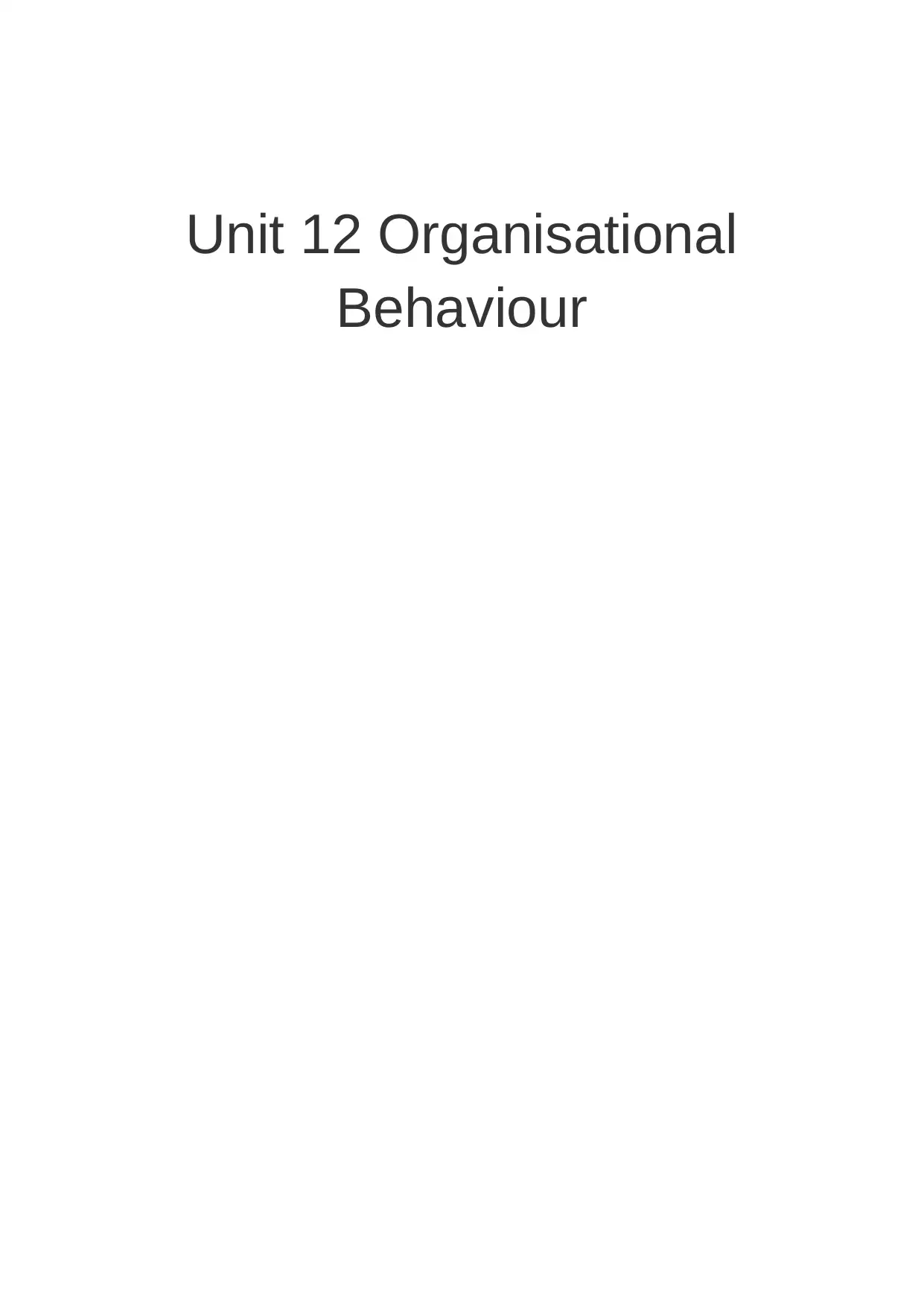
Unit 12 Organisational
Behaviour
Behaviour
Secure Best Marks with AI Grader
Need help grading? Try our AI Grader for instant feedback on your assignments.
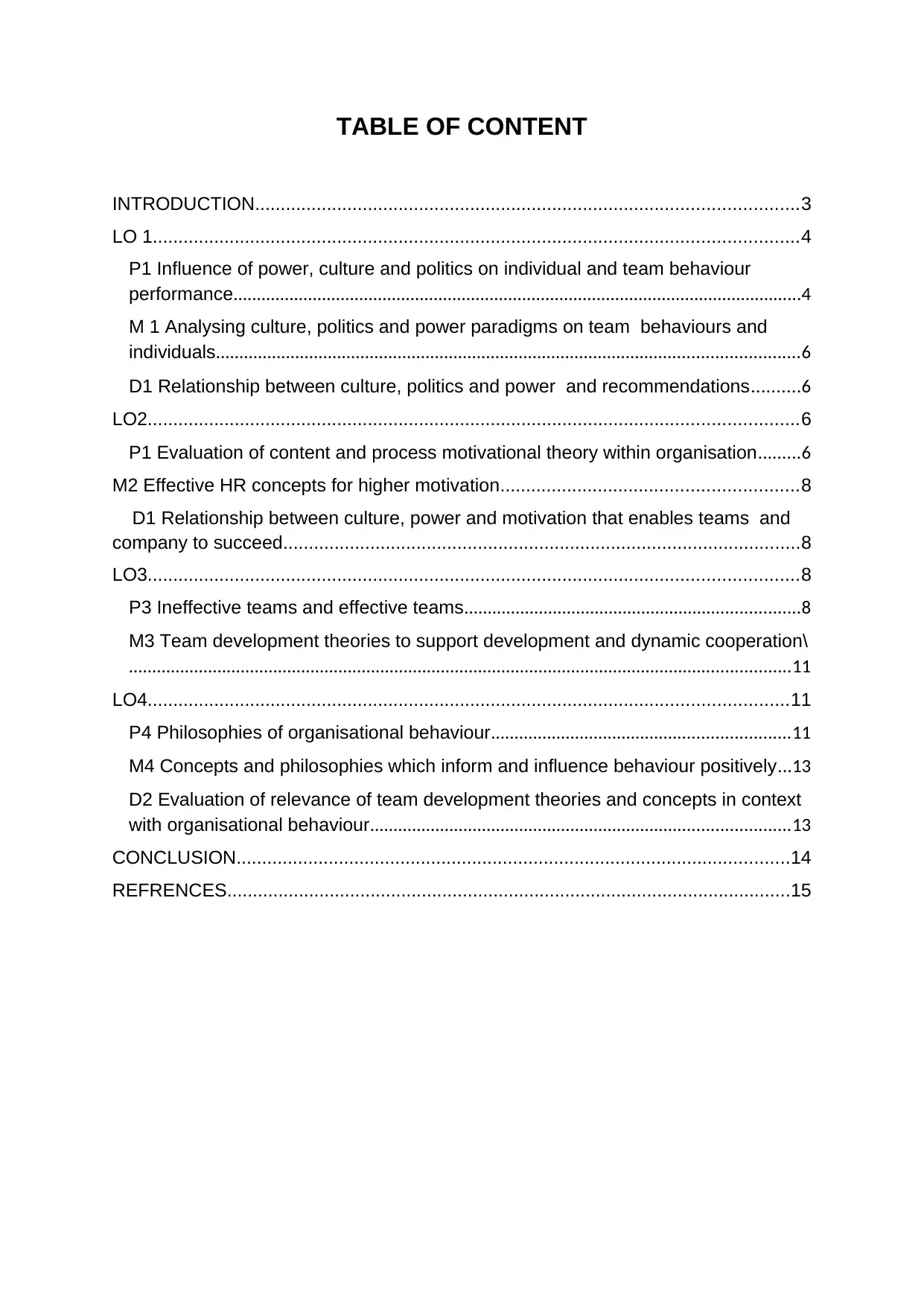
TABLE OF CONTENT
INTRODUCTION..........................................................................................................3
LO 1..............................................................................................................................4
P1 Influence of power, culture and politics on individual and team behaviour
performance..........................................................................................................................4
M 1 Analysing culture, politics and power paradigms on team behaviours and
individuals.............................................................................................................................6
D1 Relationship between culture, politics and power and recommendations..........6
LO2...............................................................................................................................6
P1 Evaluation of content and process motivational theory within organisation.........6
M2 Effective HR concepts for higher motivation..........................................................8
D1 Relationship between culture, power and motivation that enables teams and
company to succeed.....................................................................................................8
LO3...............................................................................................................................8
P3 Ineffective teams and effective teams........................................................................8
M3 Team development theories to support development and dynamic cooperation\
..............................................................................................................................................11
LO4.............................................................................................................................11
P4 Philosophies of organisational behaviour................................................................11
M4 Concepts and philosophies which inform and influence behaviour positively...13
D2 Evaluation of relevance of team development theories and concepts in context
with organisational behaviour..........................................................................................13
CONCLUSION............................................................................................................14
REFRENCES..............................................................................................................15
INTRODUCTION..........................................................................................................3
LO 1..............................................................................................................................4
P1 Influence of power, culture and politics on individual and team behaviour
performance..........................................................................................................................4
M 1 Analysing culture, politics and power paradigms on team behaviours and
individuals.............................................................................................................................6
D1 Relationship between culture, politics and power and recommendations..........6
LO2...............................................................................................................................6
P1 Evaluation of content and process motivational theory within organisation.........6
M2 Effective HR concepts for higher motivation..........................................................8
D1 Relationship between culture, power and motivation that enables teams and
company to succeed.....................................................................................................8
LO3...............................................................................................................................8
P3 Ineffective teams and effective teams........................................................................8
M3 Team development theories to support development and dynamic cooperation\
..............................................................................................................................................11
LO4.............................................................................................................................11
P4 Philosophies of organisational behaviour................................................................11
M4 Concepts and philosophies which inform and influence behaviour positively...13
D2 Evaluation of relevance of team development theories and concepts in context
with organisational behaviour..........................................................................................13
CONCLUSION............................................................................................................14
REFRENCES..............................................................................................................15
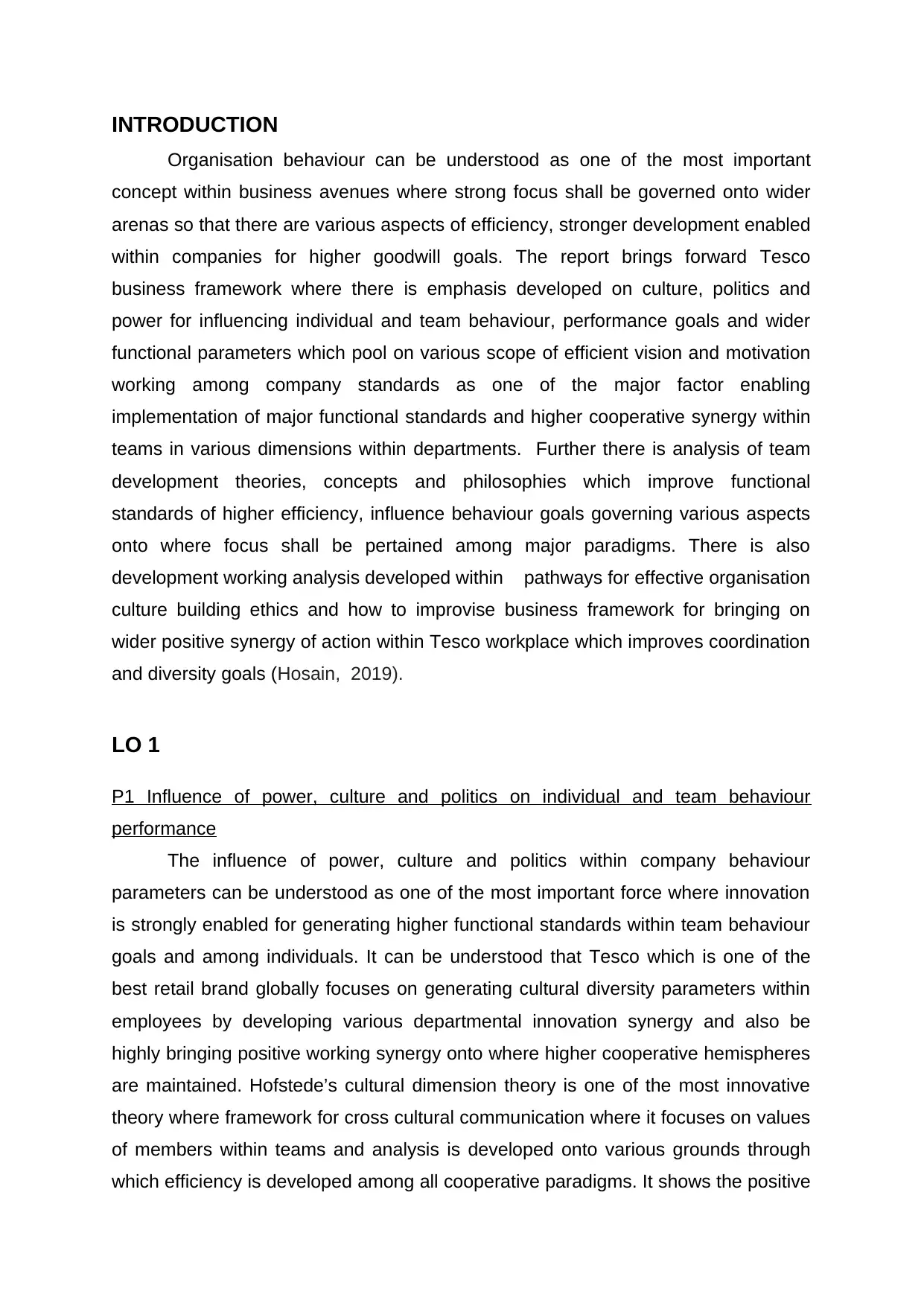
INTRODUCTION
Organisation behaviour can be understood as one of the most important
concept within business avenues where strong focus shall be governed onto wider
arenas so that there are various aspects of efficiency, stronger development enabled
within companies for higher goodwill goals. The report brings forward Tesco
business framework where there is emphasis developed on culture, politics and
power for influencing individual and team behaviour, performance goals and wider
functional parameters which pool on various scope of efficient vision and motivation
working among company standards as one of the major factor enabling
implementation of major functional standards and higher cooperative synergy within
teams in various dimensions within departments. Further there is analysis of team
development theories, concepts and philosophies which improve functional
standards of higher efficiency, influence behaviour goals governing various aspects
onto where focus shall be pertained among major paradigms. There is also
development working analysis developed within pathways for effective organisation
culture building ethics and how to improvise business framework for bringing on
wider positive synergy of action within Tesco workplace which improves coordination
and diversity goals (Hosain, 2019).
LO 1
P1 Influence of power, culture and politics on individual and team behaviour
performance
The influence of power, culture and politics within company behaviour
parameters can be understood as one of the most important force where innovation
is strongly enabled for generating higher functional standards within team behaviour
goals and among individuals. It can be understood that Tesco which is one of the
best retail brand globally focuses on generating cultural diversity parameters within
employees by developing various departmental innovation synergy and also be
highly bringing positive working synergy onto where higher cooperative hemispheres
are maintained. Hofstede’s cultural dimension theory is one of the most innovative
theory where framework for cross cultural communication where it focuses on values
of members within teams and analysis is developed onto various grounds through
which efficiency is developed among all cooperative paradigms. It shows the positive
Organisation behaviour can be understood as one of the most important
concept within business avenues where strong focus shall be governed onto wider
arenas so that there are various aspects of efficiency, stronger development enabled
within companies for higher goodwill goals. The report brings forward Tesco
business framework where there is emphasis developed on culture, politics and
power for influencing individual and team behaviour, performance goals and wider
functional parameters which pool on various scope of efficient vision and motivation
working among company standards as one of the major factor enabling
implementation of major functional standards and higher cooperative synergy within
teams in various dimensions within departments. Further there is analysis of team
development theories, concepts and philosophies which improve functional
standards of higher efficiency, influence behaviour goals governing various aspects
onto where focus shall be pertained among major paradigms. There is also
development working analysis developed within pathways for effective organisation
culture building ethics and how to improvise business framework for bringing on
wider positive synergy of action within Tesco workplace which improves coordination
and diversity goals (Hosain, 2019).
LO 1
P1 Influence of power, culture and politics on individual and team behaviour
performance
The influence of power, culture and politics within company behaviour
parameters can be understood as one of the most important force where innovation
is strongly enabled for generating higher functional standards within team behaviour
goals and among individuals. It can be understood that Tesco which is one of the
best retail brand globally focuses on generating cultural diversity parameters within
employees by developing various departmental innovation synergy and also be
highly bringing positive working synergy onto where higher cooperative hemispheres
are maintained. Hofstede’s cultural dimension theory is one of the most innovative
theory where framework for cross cultural communication where it focuses on values
of members within teams and analysis is developed onto various grounds through
which efficiency is developed among all cooperative paradigms. It shows the positive
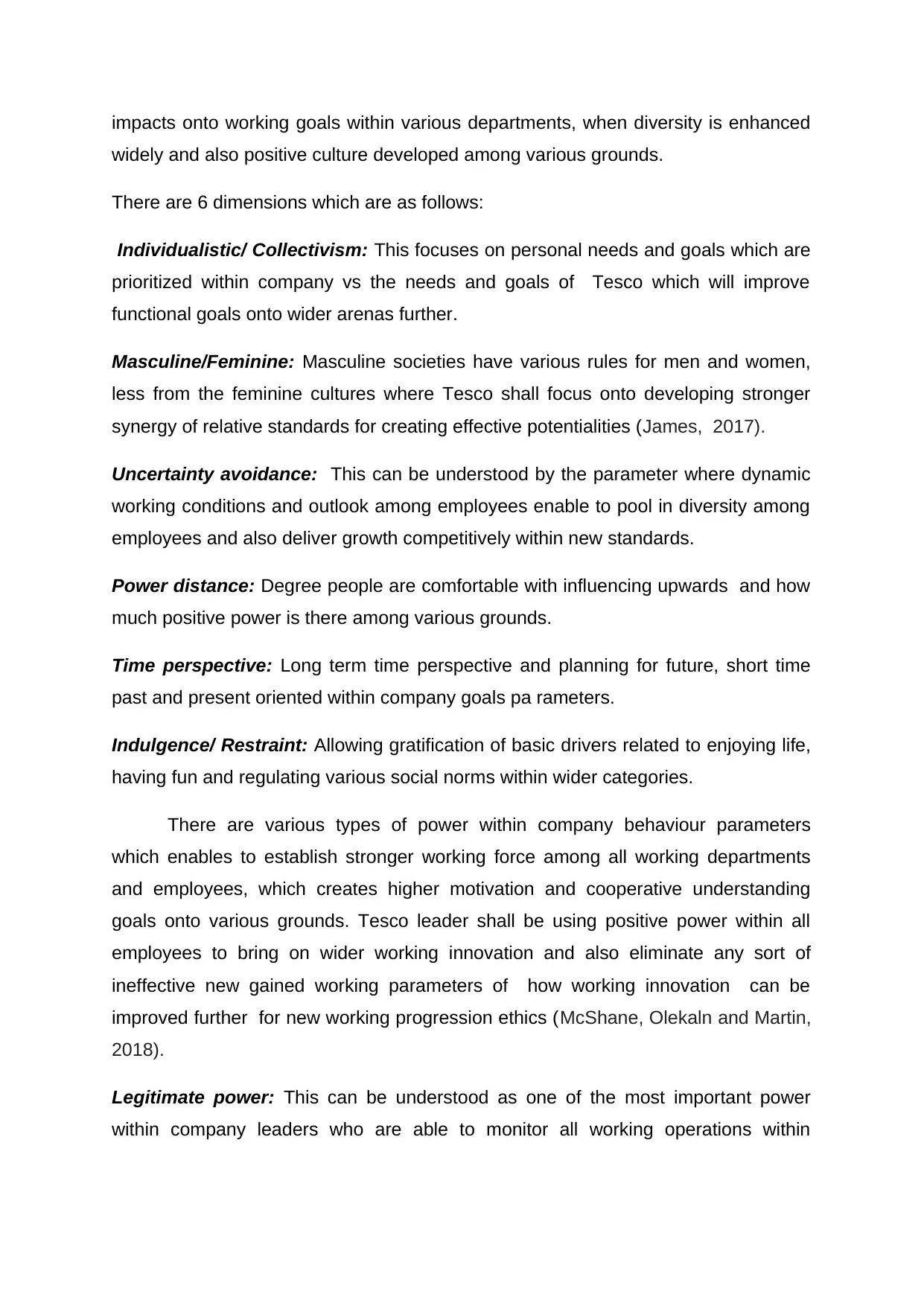
impacts onto working goals within various departments, when diversity is enhanced
widely and also positive culture developed among various grounds.
There are 6 dimensions which are as follows:
Individualistic/ Collectivism: This focuses on personal needs and goals which are
prioritized within company vs the needs and goals of Tesco which will improve
functional goals onto wider arenas further.
Masculine/Feminine: Masculine societies have various rules for men and women,
less from the feminine cultures where Tesco shall focus onto developing stronger
synergy of relative standards for creating effective potentialities (James, 2017).
Uncertainty avoidance: This can be understood by the parameter where dynamic
working conditions and outlook among employees enable to pool in diversity among
employees and also deliver growth competitively within new standards.
Power distance: Degree people are comfortable with influencing upwards and how
much positive power is there among various grounds.
Time perspective: Long term time perspective and planning for future, short time
past and present oriented within company goals pa rameters.
Indulgence/ Restraint: Allowing gratification of basic drivers related to enjoying life,
having fun and regulating various social norms within wider categories.
There are various types of power within company behaviour parameters
which enables to establish stronger working force among all working departments
and employees, which creates higher motivation and cooperative understanding
goals onto various grounds. Tesco leader shall be using positive power within all
employees to bring on wider working innovation and also eliminate any sort of
ineffective new gained working parameters of how working innovation can be
improved further for new working progression ethics (McShane, Olekaln and Martin,
2018).
Legitimate power: This can be understood as one of the most important power
within company leaders who are able to monitor all working operations within
widely and also positive culture developed among various grounds.
There are 6 dimensions which are as follows:
Individualistic/ Collectivism: This focuses on personal needs and goals which are
prioritized within company vs the needs and goals of Tesco which will improve
functional goals onto wider arenas further.
Masculine/Feminine: Masculine societies have various rules for men and women,
less from the feminine cultures where Tesco shall focus onto developing stronger
synergy of relative standards for creating effective potentialities (James, 2017).
Uncertainty avoidance: This can be understood by the parameter where dynamic
working conditions and outlook among employees enable to pool in diversity among
employees and also deliver growth competitively within new standards.
Power distance: Degree people are comfortable with influencing upwards and how
much positive power is there among various grounds.
Time perspective: Long term time perspective and planning for future, short time
past and present oriented within company goals pa rameters.
Indulgence/ Restraint: Allowing gratification of basic drivers related to enjoying life,
having fun and regulating various social norms within wider categories.
There are various types of power within company behaviour parameters
which enables to establish stronger working force among all working departments
and employees, which creates higher motivation and cooperative understanding
goals onto various grounds. Tesco leader shall be using positive power within all
employees to bring on wider working innovation and also eliminate any sort of
ineffective new gained working parameters of how working innovation can be
improved further for new working progression ethics (McShane, Olekaln and Martin,
2018).
Legitimate power: This can be understood as one of the most important power
within company leaders who are able to monitor all working operations within
Secure Best Marks with AI Grader
Need help grading? Try our AI Grader for instant feedback on your assignments.
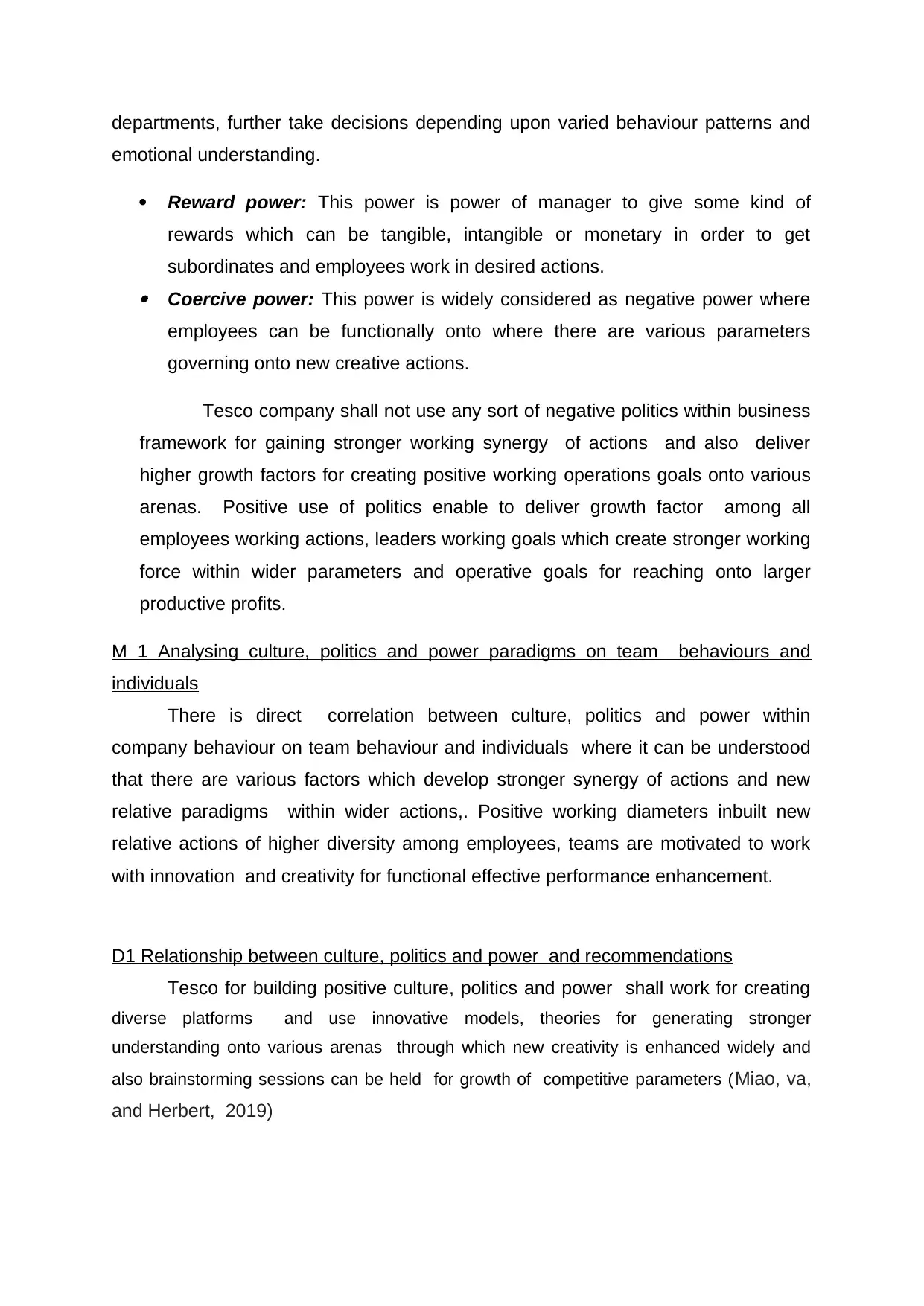
departments, further take decisions depending upon varied behaviour patterns and
emotional understanding.
Reward power: This power is power of manager to give some kind of
rewards which can be tangible, intangible or monetary in order to get
subordinates and employees work in desired actions. Coercive power: This power is widely considered as negative power where
employees can be functionally onto where there are various parameters
governing onto new creative actions.
Tesco company shall not use any sort of negative politics within business
framework for gaining stronger working synergy of actions and also deliver
higher growth factors for creating positive working operations goals onto various
arenas. Positive use of politics enable to deliver growth factor among all
employees working actions, leaders working goals which create stronger working
force within wider parameters and operative goals for reaching onto larger
productive profits.
M 1 Analysing culture, politics and power paradigms on team behaviours and
individuals
There is direct correlation between culture, politics and power within
company behaviour on team behaviour and individuals where it can be understood
that there are various factors which develop stronger synergy of actions and new
relative paradigms within wider actions,. Positive working diameters inbuilt new
relative actions of higher diversity among employees, teams are motivated to work
with innovation and creativity for functional effective performance enhancement.
D1 Relationship between culture, politics and power and recommendations
Tesco for building positive culture, politics and power shall work for creating
diverse platforms and use innovative models, theories for generating stronger
understanding onto various arenas through which new creativity is enhanced widely and
also brainstorming sessions can be held for growth of competitive parameters (Miao, va,
and Herbert, 2019)
emotional understanding.
Reward power: This power is power of manager to give some kind of
rewards which can be tangible, intangible or monetary in order to get
subordinates and employees work in desired actions. Coercive power: This power is widely considered as negative power where
employees can be functionally onto where there are various parameters
governing onto new creative actions.
Tesco company shall not use any sort of negative politics within business
framework for gaining stronger working synergy of actions and also deliver
higher growth factors for creating positive working operations goals onto various
arenas. Positive use of politics enable to deliver growth factor among all
employees working actions, leaders working goals which create stronger working
force within wider parameters and operative goals for reaching onto larger
productive profits.
M 1 Analysing culture, politics and power paradigms on team behaviours and
individuals
There is direct correlation between culture, politics and power within
company behaviour on team behaviour and individuals where it can be understood
that there are various factors which develop stronger synergy of actions and new
relative paradigms within wider actions,. Positive working diameters inbuilt new
relative actions of higher diversity among employees, teams are motivated to work
with innovation and creativity for functional effective performance enhancement.
D1 Relationship between culture, politics and power and recommendations
Tesco for building positive culture, politics and power shall work for creating
diverse platforms and use innovative models, theories for generating stronger
understanding onto various arenas through which new creativity is enhanced widely and
also brainstorming sessions can be held for growth of competitive parameters (Miao, va,
and Herbert, 2019)
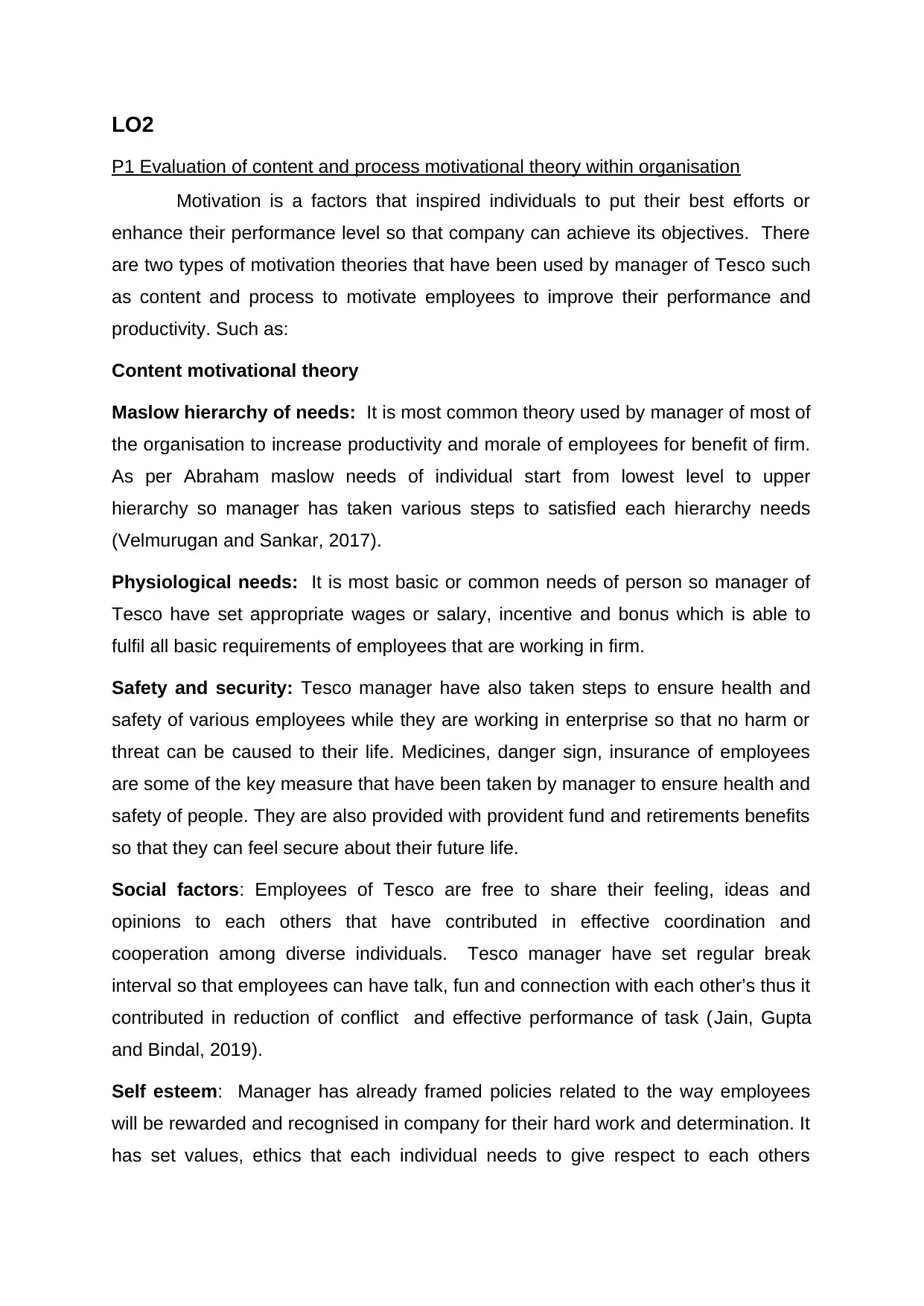
LO2
P1 Evaluation of content and process motivational theory within organisation
Motivation is a factors that inspired individuals to put their best efforts or
enhance their performance level so that company can achieve its objectives. There
are two types of motivation theories that have been used by manager of Tesco such
as content and process to motivate employees to improve their performance and
productivity. Such as:
Content motivational theory
Maslow hierarchy of needs: It is most common theory used by manager of most of
the organisation to increase productivity and morale of employees for benefit of firm.
As per Abraham maslow needs of individual start from lowest level to upper
hierarchy so manager has taken various steps to satisfied each hierarchy needs
(Velmurugan and Sankar, 2017).
Physiological needs: It is most basic or common needs of person so manager of
Tesco have set appropriate wages or salary, incentive and bonus which is able to
fulfil all basic requirements of employees that are working in firm.
Safety and security: Tesco manager have also taken steps to ensure health and
safety of various employees while they are working in enterprise so that no harm or
threat can be caused to their life. Medicines, danger sign, insurance of employees
are some of the key measure that have been taken by manager to ensure health and
safety of people. They are also provided with provident fund and retirements benefits
so that they can feel secure about their future life.
Social factors: Employees of Tesco are free to share their feeling, ideas and
opinions to each others that have contributed in effective coordination and
cooperation among diverse individuals. Tesco manager have set regular break
interval so that employees can have talk, fun and connection with each other’s thus it
contributed in reduction of conflict and effective performance of task (Jain, Gupta
and Bindal, 2019).
Self esteem: Manager has already framed policies related to the way employees
will be rewarded and recognised in company for their hard work and determination. It
has set values, ethics that each individual needs to give respect to each others
P1 Evaluation of content and process motivational theory within organisation
Motivation is a factors that inspired individuals to put their best efforts or
enhance their performance level so that company can achieve its objectives. There
are two types of motivation theories that have been used by manager of Tesco such
as content and process to motivate employees to improve their performance and
productivity. Such as:
Content motivational theory
Maslow hierarchy of needs: It is most common theory used by manager of most of
the organisation to increase productivity and morale of employees for benefit of firm.
As per Abraham maslow needs of individual start from lowest level to upper
hierarchy so manager has taken various steps to satisfied each hierarchy needs
(Velmurugan and Sankar, 2017).
Physiological needs: It is most basic or common needs of person so manager of
Tesco have set appropriate wages or salary, incentive and bonus which is able to
fulfil all basic requirements of employees that are working in firm.
Safety and security: Tesco manager have also taken steps to ensure health and
safety of various employees while they are working in enterprise so that no harm or
threat can be caused to their life. Medicines, danger sign, insurance of employees
are some of the key measure that have been taken by manager to ensure health and
safety of people. They are also provided with provident fund and retirements benefits
so that they can feel secure about their future life.
Social factors: Employees of Tesco are free to share their feeling, ideas and
opinions to each others that have contributed in effective coordination and
cooperation among diverse individuals. Tesco manager have set regular break
interval so that employees can have talk, fun and connection with each other’s thus it
contributed in reduction of conflict and effective performance of task (Jain, Gupta
and Bindal, 2019).
Self esteem: Manager has already framed policies related to the way employees
will be rewarded and recognised in company for their hard work and determination. It
has set values, ethics that each individual needs to give respect to each others
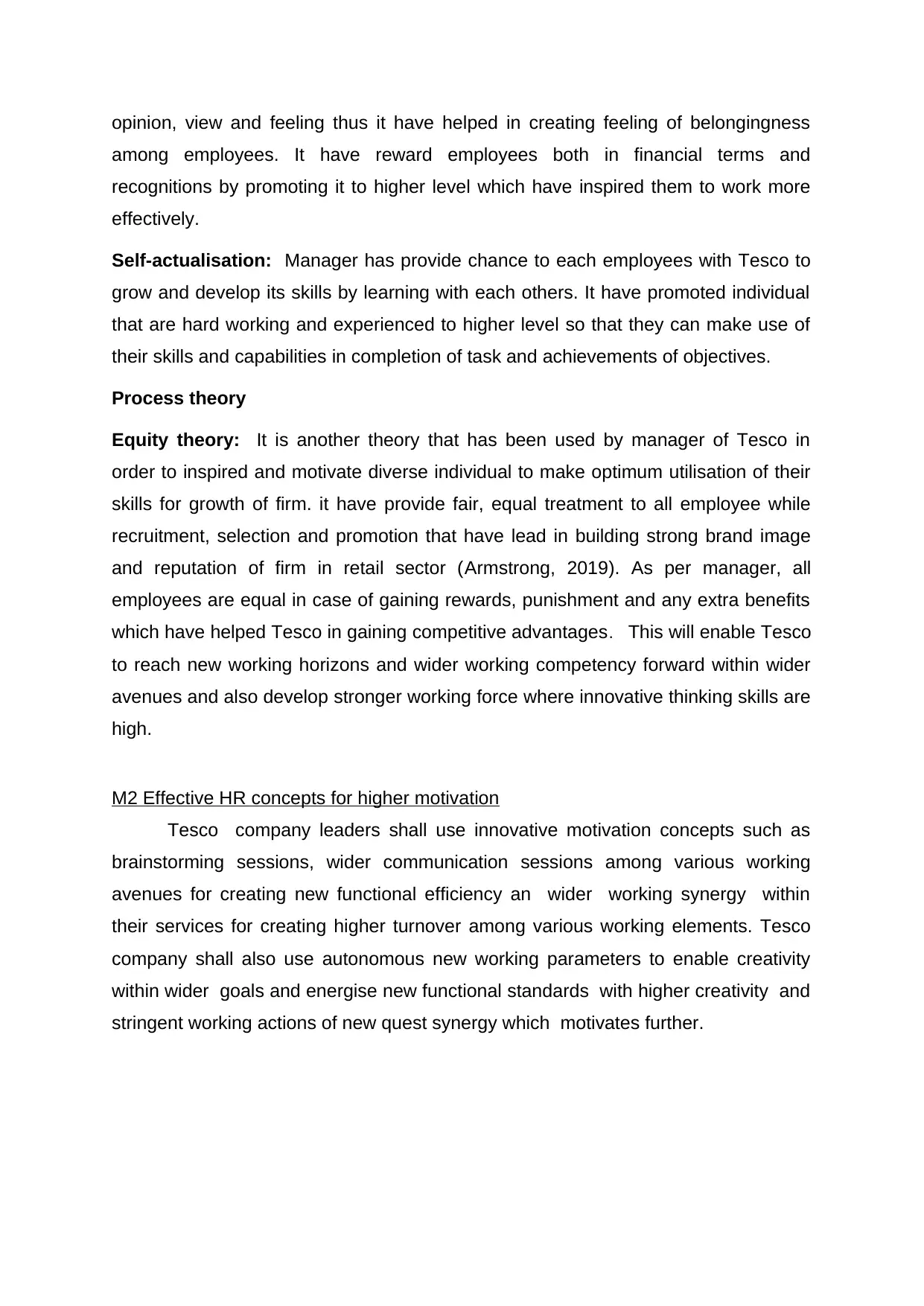
opinion, view and feeling thus it have helped in creating feeling of belongingness
among employees. It have reward employees both in financial terms and
recognitions by promoting it to higher level which have inspired them to work more
effectively.
Self-actualisation: Manager has provide chance to each employees with Tesco to
grow and develop its skills by learning with each others. It have promoted individual
that are hard working and experienced to higher level so that they can make use of
their skills and capabilities in completion of task and achievements of objectives.
Process theory
Equity theory: It is another theory that has been used by manager of Tesco in
order to inspired and motivate diverse individual to make optimum utilisation of their
skills for growth of firm. it have provide fair, equal treatment to all employee while
recruitment, selection and promotion that have lead in building strong brand image
and reputation of firm in retail sector (Armstrong, 2019). As per manager, all
employees are equal in case of gaining rewards, punishment and any extra benefits
which have helped Tesco in gaining competitive advantages. This will enable Tesco
to reach new working horizons and wider working competency forward within wider
avenues and also develop stronger working force where innovative thinking skills are
high.
M2 Effective HR concepts for higher motivation
Tesco company leaders shall use innovative motivation concepts such as
brainstorming sessions, wider communication sessions among various working
avenues for creating new functional efficiency an wider working synergy within
their services for creating higher turnover among various working elements. Tesco
company shall also use autonomous new working parameters to enable creativity
within wider goals and energise new functional standards with higher creativity and
stringent working actions of new quest synergy which motivates further.
among employees. It have reward employees both in financial terms and
recognitions by promoting it to higher level which have inspired them to work more
effectively.
Self-actualisation: Manager has provide chance to each employees with Tesco to
grow and develop its skills by learning with each others. It have promoted individual
that are hard working and experienced to higher level so that they can make use of
their skills and capabilities in completion of task and achievements of objectives.
Process theory
Equity theory: It is another theory that has been used by manager of Tesco in
order to inspired and motivate diverse individual to make optimum utilisation of their
skills for growth of firm. it have provide fair, equal treatment to all employee while
recruitment, selection and promotion that have lead in building strong brand image
and reputation of firm in retail sector (Armstrong, 2019). As per manager, all
employees are equal in case of gaining rewards, punishment and any extra benefits
which have helped Tesco in gaining competitive advantages. This will enable Tesco
to reach new working horizons and wider working competency forward within wider
avenues and also develop stronger working force where innovative thinking skills are
high.
M2 Effective HR concepts for higher motivation
Tesco company leaders shall use innovative motivation concepts such as
brainstorming sessions, wider communication sessions among various working
avenues for creating new functional efficiency an wider working synergy within
their services for creating higher turnover among various working elements. Tesco
company shall also use autonomous new working parameters to enable creativity
within wider goals and energise new functional standards with higher creativity and
stringent working actions of new quest synergy which motivates further.
Paraphrase This Document
Need a fresh take? Get an instant paraphrase of this document with our AI Paraphraser
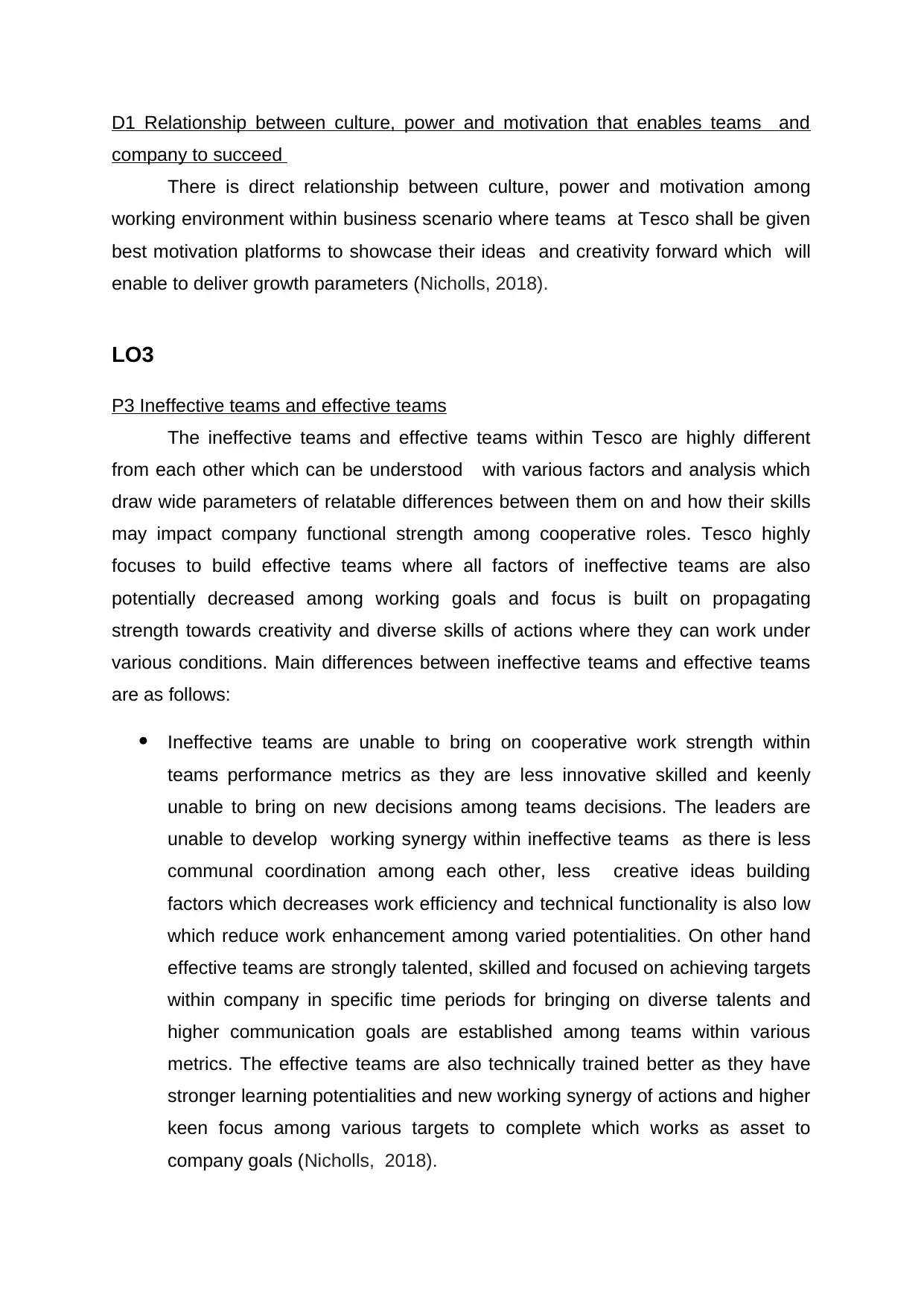
D1 Relationship between culture, power and motivation that enables teams and
company to succeed
There is direct relationship between culture, power and motivation among
working environment within business scenario where teams at Tesco shall be given
best motivation platforms to showcase their ideas and creativity forward which will
enable to deliver growth parameters (Nicholls, 2018).
LO3
P3 Ineffective teams and effective teams
The ineffective teams and effective teams within Tesco are highly different
from each other which can be understood with various factors and analysis which
draw wide parameters of relatable differences between them on and how their skills
may impact company functional strength among cooperative roles. Tesco highly
focuses to build effective teams where all factors of ineffective teams are also
potentially decreased among working goals and focus is built on propagating
strength towards creativity and diverse skills of actions where they can work under
various conditions. Main differences between ineffective teams and effective teams
are as follows:
Ineffective teams are unable to bring on cooperative work strength within
teams performance metrics as they are less innovative skilled and keenly
unable to bring on new decisions among teams decisions. The leaders are
unable to develop working synergy within ineffective teams as there is less
communal coordination among each other, less creative ideas building
factors which decreases work efficiency and technical functionality is also low
which reduce work enhancement among varied potentialities. On other hand
effective teams are strongly talented, skilled and focused on achieving targets
within company in specific time periods for bringing on diverse talents and
higher communication goals are established among teams within various
metrics. The effective teams are also technically trained better as they have
stronger learning potentialities and new working synergy of actions and higher
keen focus among various targets to complete which works as asset to
company goals (Nicholls, 2018).
company to succeed
There is direct relationship between culture, power and motivation among
working environment within business scenario where teams at Tesco shall be given
best motivation platforms to showcase their ideas and creativity forward which will
enable to deliver growth parameters (Nicholls, 2018).
LO3
P3 Ineffective teams and effective teams
The ineffective teams and effective teams within Tesco are highly different
from each other which can be understood with various factors and analysis which
draw wide parameters of relatable differences between them on and how their skills
may impact company functional strength among cooperative roles. Tesco highly
focuses to build effective teams where all factors of ineffective teams are also
potentially decreased among working goals and focus is built on propagating
strength towards creativity and diverse skills of actions where they can work under
various conditions. Main differences between ineffective teams and effective teams
are as follows:
Ineffective teams are unable to bring on cooperative work strength within
teams performance metrics as they are less innovative skilled and keenly
unable to bring on new decisions among teams decisions. The leaders are
unable to develop working synergy within ineffective teams as there is less
communal coordination among each other, less creative ideas building
factors which decreases work efficiency and technical functionality is also low
which reduce work enhancement among varied potentialities. On other hand
effective teams are strongly talented, skilled and focused on achieving targets
within company in specific time periods for bringing on diverse talents and
higher communication goals are established among teams within various
metrics. The effective teams are also technically trained better as they have
stronger learning potentialities and new working synergy of actions and higher
keen focus among various targets to complete which works as asset to
company goals (Nicholls, 2018).
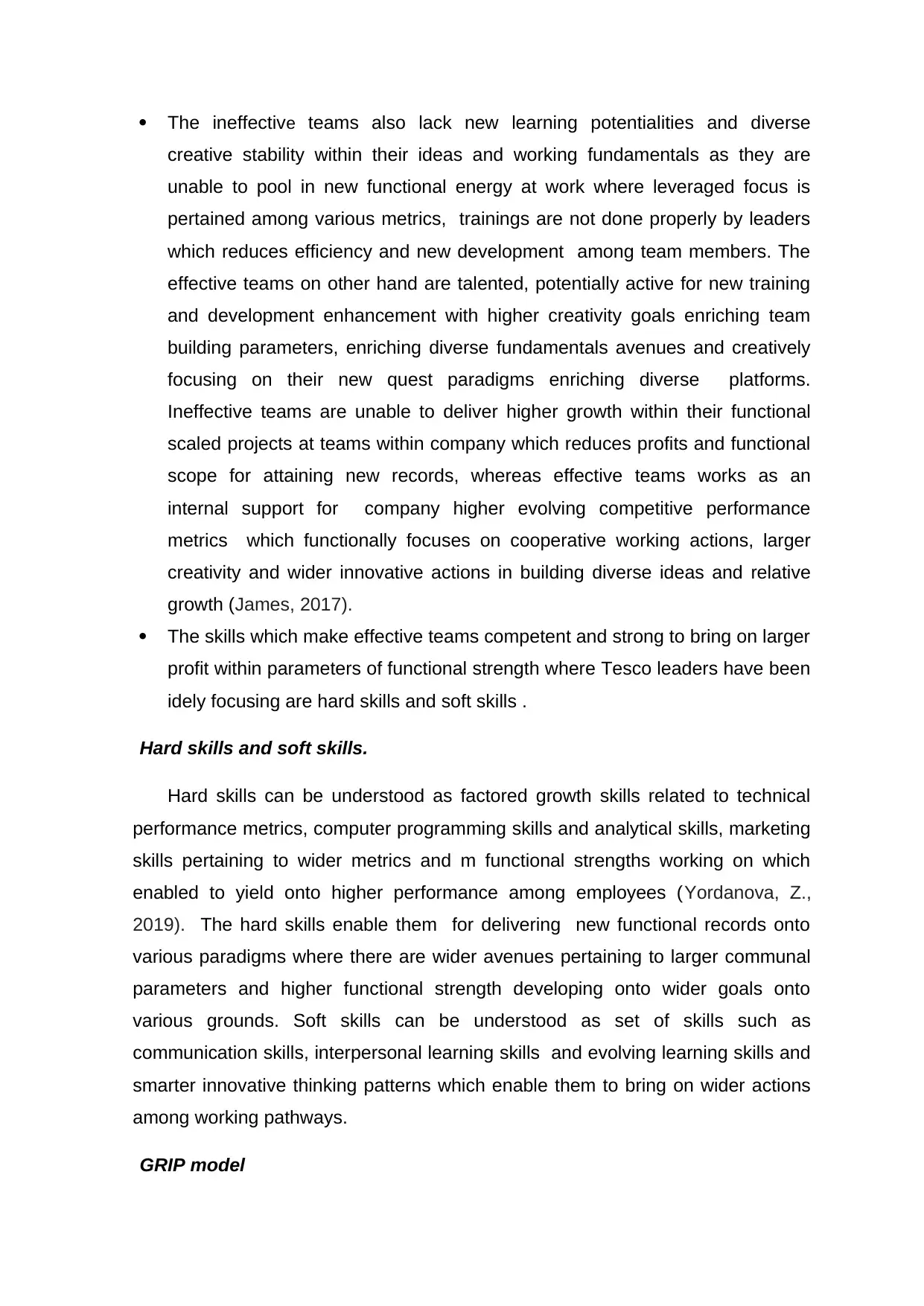
The ineffective teams also lack new learning potentialities and diverse
creative stability within their ideas and working fundamentals as they are
unable to pool in new functional energy at work where leveraged focus is
pertained among various metrics, trainings are not done properly by leaders
which reduces efficiency and new development among team members. The
effective teams on other hand are talented, potentially active for new training
and development enhancement with higher creativity goals enriching team
building parameters, enriching diverse fundamentals avenues and creatively
focusing on their new quest paradigms enriching diverse platforms.
Ineffective teams are unable to deliver higher growth within their functional
scaled projects at teams within company which reduces profits and functional
scope for attaining new records, whereas effective teams works as an
internal support for company higher evolving competitive performance
metrics which functionally focuses on cooperative working actions, larger
creativity and wider innovative actions in building diverse ideas and relative
growth (James, 2017).
The skills which make effective teams competent and strong to bring on larger
profit within parameters of functional strength where Tesco leaders have been
idely focusing are hard skills and soft skills .
Hard skills and soft skills.
Hard skills can be understood as factored growth skills related to technical
performance metrics, computer programming skills and analytical skills, marketing
skills pertaining to wider metrics and m functional strengths working on which
enabled to yield onto higher performance among employees (Yordanova, Z.,
2019). The hard skills enable them for delivering new functional records onto
various paradigms where there are wider avenues pertaining to larger communal
parameters and higher functional strength developing onto wider goals onto
various grounds. Soft skills can be understood as set of skills such as
communication skills, interpersonal learning skills and evolving learning skills and
smarter innovative thinking patterns which enable them to bring on wider actions
among working pathways.
GRIP model
creative stability within their ideas and working fundamentals as they are
unable to pool in new functional energy at work where leveraged focus is
pertained among various metrics, trainings are not done properly by leaders
which reduces efficiency and new development among team members. The
effective teams on other hand are talented, potentially active for new training
and development enhancement with higher creativity goals enriching team
building parameters, enriching diverse fundamentals avenues and creatively
focusing on their new quest paradigms enriching diverse platforms.
Ineffective teams are unable to deliver higher growth within their functional
scaled projects at teams within company which reduces profits and functional
scope for attaining new records, whereas effective teams works as an
internal support for company higher evolving competitive performance
metrics which functionally focuses on cooperative working actions, larger
creativity and wider innovative actions in building diverse ideas and relative
growth (James, 2017).
The skills which make effective teams competent and strong to bring on larger
profit within parameters of functional strength where Tesco leaders have been
idely focusing are hard skills and soft skills .
Hard skills and soft skills.
Hard skills can be understood as factored growth skills related to technical
performance metrics, computer programming skills and analytical skills, marketing
skills pertaining to wider metrics and m functional strengths working on which
enabled to yield onto higher performance among employees (Yordanova, Z.,
2019). The hard skills enable them for delivering new functional records onto
various paradigms where there are wider avenues pertaining to larger communal
parameters and higher functional strength developing onto wider goals onto
various grounds. Soft skills can be understood as set of skills such as
communication skills, interpersonal learning skills and evolving learning skills and
smarter innovative thinking patterns which enable them to bring on wider actions
among working pathways.
GRIP model
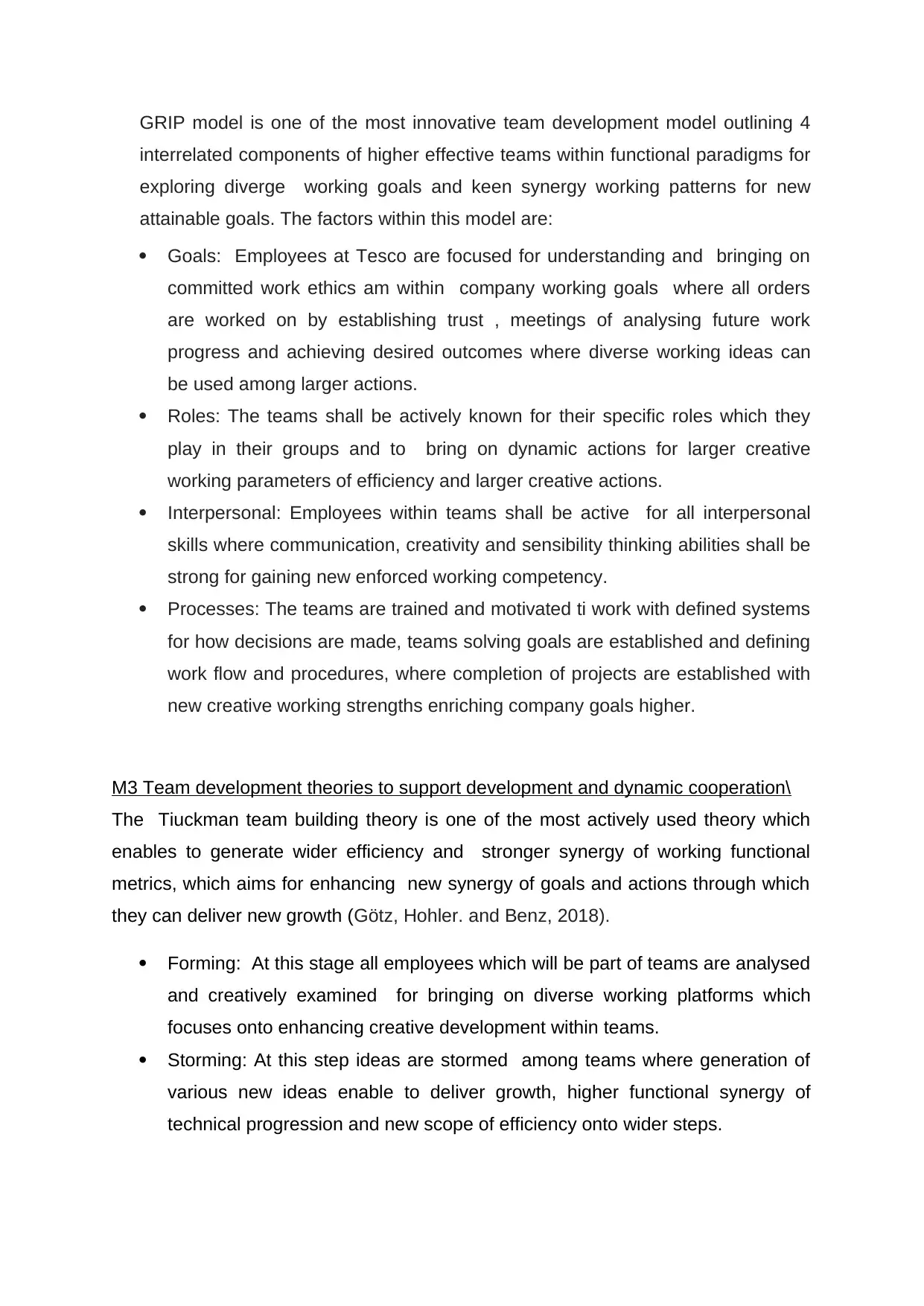
GRIP model is one of the most innovative team development model outlining 4
interrelated components of higher effective teams within functional paradigms for
exploring diverge working goals and keen synergy working patterns for new
attainable goals. The factors within this model are:
Goals: Employees at Tesco are focused for understanding and bringing on
committed work ethics am within company working goals where all orders
are worked on by establishing trust , meetings of analysing future work
progress and achieving desired outcomes where diverse working ideas can
be used among larger actions.
Roles: The teams shall be actively known for their specific roles which they
play in their groups and to bring on dynamic actions for larger creative
working parameters of efficiency and larger creative actions.
Interpersonal: Employees within teams shall be active for all interpersonal
skills where communication, creativity and sensibility thinking abilities shall be
strong for gaining new enforced working competency.
Processes: The teams are trained and motivated ti work with defined systems
for how decisions are made, teams solving goals are established and defining
work flow and procedures, where completion of projects are established with
new creative working strengths enriching company goals higher.
M3 Team development theories to support development and dynamic cooperation\
The Tiuckman team building theory is one of the most actively used theory which
enables to generate wider efficiency and stronger synergy of working functional
metrics, which aims for enhancing new synergy of goals and actions through which
they can deliver new growth (Götz, Hohler. and Benz, 2018).
Forming: At this stage all employees which will be part of teams are analysed
and creatively examined for bringing on diverse working platforms which
focuses onto enhancing creative development within teams.
Storming: At this step ideas are stormed among teams where generation of
various new ideas enable to deliver growth, higher functional synergy of
technical progression and new scope of efficiency onto wider steps.
interrelated components of higher effective teams within functional paradigms for
exploring diverge working goals and keen synergy working patterns for new
attainable goals. The factors within this model are:
Goals: Employees at Tesco are focused for understanding and bringing on
committed work ethics am within company working goals where all orders
are worked on by establishing trust , meetings of analysing future work
progress and achieving desired outcomes where diverse working ideas can
be used among larger actions.
Roles: The teams shall be actively known for their specific roles which they
play in their groups and to bring on dynamic actions for larger creative
working parameters of efficiency and larger creative actions.
Interpersonal: Employees within teams shall be active for all interpersonal
skills where communication, creativity and sensibility thinking abilities shall be
strong for gaining new enforced working competency.
Processes: The teams are trained and motivated ti work with defined systems
for how decisions are made, teams solving goals are established and defining
work flow and procedures, where completion of projects are established with
new creative working strengths enriching company goals higher.
M3 Team development theories to support development and dynamic cooperation\
The Tiuckman team building theory is one of the most actively used theory which
enables to generate wider efficiency and stronger synergy of working functional
metrics, which aims for enhancing new synergy of goals and actions through which
they can deliver new growth (Götz, Hohler. and Benz, 2018).
Forming: At this stage all employees which will be part of teams are analysed
and creatively examined for bringing on diverse working platforms which
focuses onto enhancing creative development within teams.
Storming: At this step ideas are stormed among teams where generation of
various new ideas enable to deliver growth, higher functional synergy of
technical progression and new scope of efficiency onto wider steps.
Secure Best Marks with AI Grader
Need help grading? Try our AI Grader for instant feedback on your assignments.
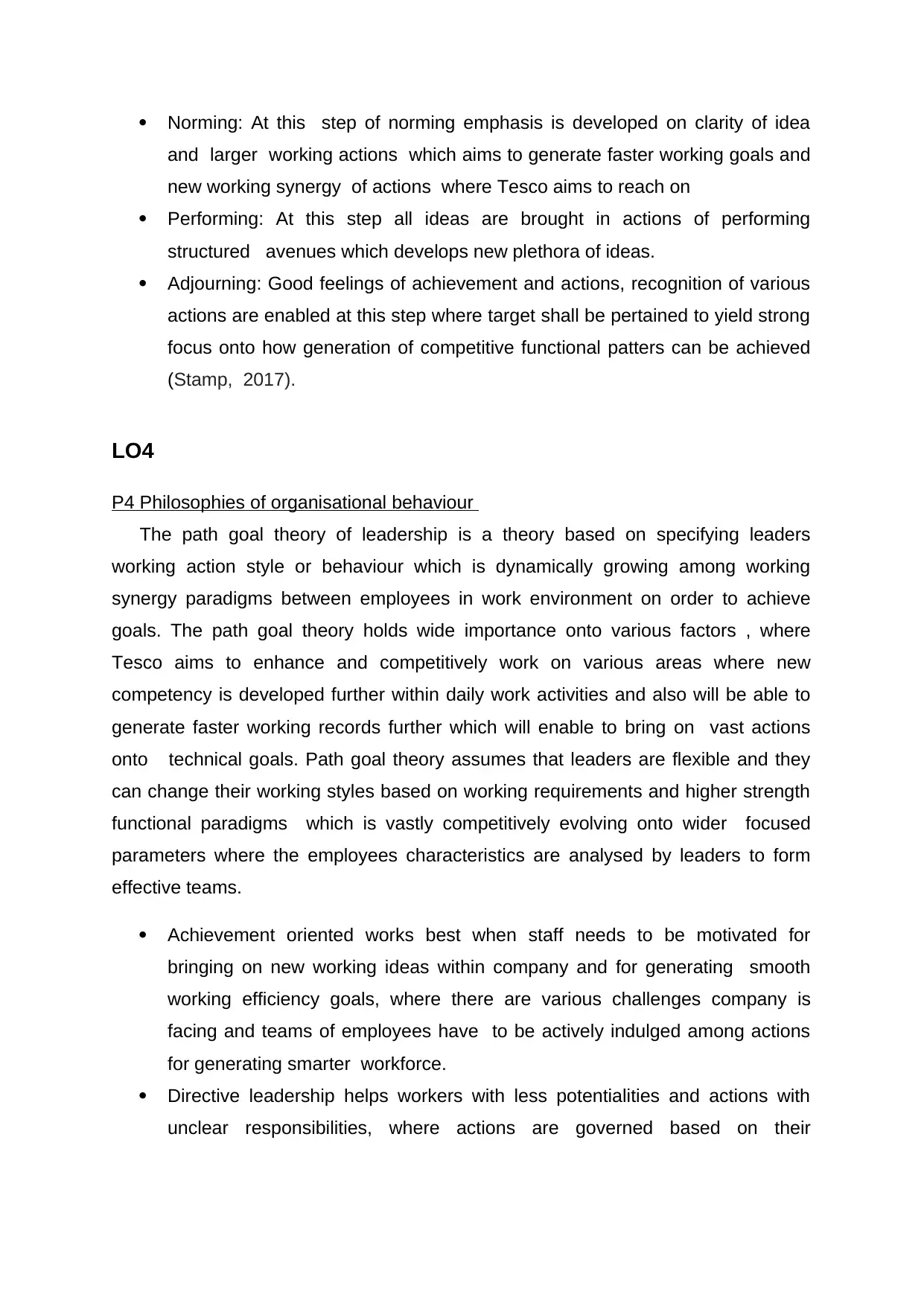
Norming: At this step of norming emphasis is developed on clarity of idea
and larger working actions which aims to generate faster working goals and
new working synergy of actions where Tesco aims to reach on
Performing: At this step all ideas are brought in actions of performing
structured avenues which develops new plethora of ideas.
Adjourning: Good feelings of achievement and actions, recognition of various
actions are enabled at this step where target shall be pertained to yield strong
focus onto how generation of competitive functional patters can be achieved
(Stamp, 2017).
LO4
P4 Philosophies of organisational behaviour
The path goal theory of leadership is a theory based on specifying leaders
working action style or behaviour which is dynamically growing among working
synergy paradigms between employees in work environment on order to achieve
goals. The path goal theory holds wide importance onto various factors , where
Tesco aims to enhance and competitively work on various areas where new
competency is developed further within daily work activities and also will be able to
generate faster working records further which will enable to bring on vast actions
onto technical goals. Path goal theory assumes that leaders are flexible and they
can change their working styles based on working requirements and higher strength
functional paradigms which is vastly competitively evolving onto wider focused
parameters where the employees characteristics are analysed by leaders to form
effective teams.
Achievement oriented works best when staff needs to be motivated for
bringing on new working ideas within company and for generating smooth
working efficiency goals, where there are various challenges company is
facing and teams of employees have to be actively indulged among actions
for generating smarter workforce.
Directive leadership helps workers with less potentialities and actions with
unclear responsibilities, where actions are governed based on their
and larger working actions which aims to generate faster working goals and
new working synergy of actions where Tesco aims to reach on
Performing: At this step all ideas are brought in actions of performing
structured avenues which develops new plethora of ideas.
Adjourning: Good feelings of achievement and actions, recognition of various
actions are enabled at this step where target shall be pertained to yield strong
focus onto how generation of competitive functional patters can be achieved
(Stamp, 2017).
LO4
P4 Philosophies of organisational behaviour
The path goal theory of leadership is a theory based on specifying leaders
working action style or behaviour which is dynamically growing among working
synergy paradigms between employees in work environment on order to achieve
goals. The path goal theory holds wide importance onto various factors , where
Tesco aims to enhance and competitively work on various areas where new
competency is developed further within daily work activities and also will be able to
generate faster working records further which will enable to bring on vast actions
onto technical goals. Path goal theory assumes that leaders are flexible and they
can change their working styles based on working requirements and higher strength
functional paradigms which is vastly competitively evolving onto wider focused
parameters where the employees characteristics are analysed by leaders to form
effective teams.
Achievement oriented works best when staff needs to be motivated for
bringing on new working ideas within company and for generating smooth
working efficiency goals, where there are various challenges company is
facing and teams of employees have to be actively indulged among actions
for generating smarter workforce.
Directive leadership helps workers with less potentialities and actions with
unclear responsibilities, where actions are governed based on their
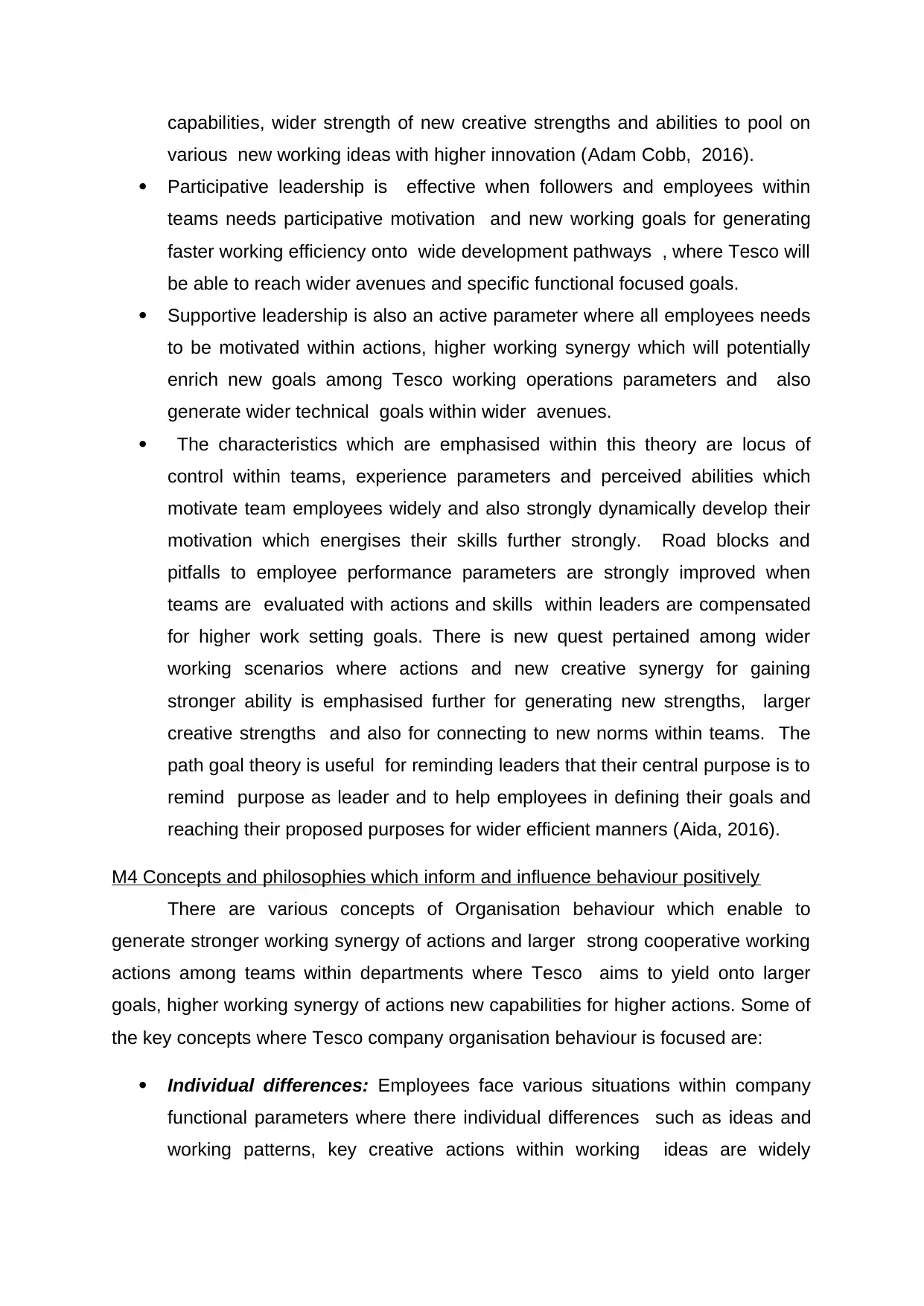
capabilities, wider strength of new creative strengths and abilities to pool on
various new working ideas with higher innovation (Adam Cobb, 2016).
Participative leadership is effective when followers and employees within
teams needs participative motivation and new working goals for generating
faster working efficiency onto wide development pathways , where Tesco will
be able to reach wider avenues and specific functional focused goals.
Supportive leadership is also an active parameter where all employees needs
to be motivated within actions, higher working synergy which will potentially
enrich new goals among Tesco working operations parameters and also
generate wider technical goals within wider avenues.
The characteristics which are emphasised within this theory are locus of
control within teams, experience parameters and perceived abilities which
motivate team employees widely and also strongly dynamically develop their
motivation which energises their skills further strongly. Road blocks and
pitfalls to employee performance parameters are strongly improved when
teams are evaluated with actions and skills within leaders are compensated
for higher work setting goals. There is new quest pertained among wider
working scenarios where actions and new creative synergy for gaining
stronger ability is emphasised further for generating new strengths, larger
creative strengths and also for connecting to new norms within teams. The
path goal theory is useful for reminding leaders that their central purpose is to
remind purpose as leader and to help employees in defining their goals and
reaching their proposed purposes for wider efficient manners (Aida, 2016).
M4 Concepts and philosophies which inform and influence behaviour positively
There are various concepts of Organisation behaviour which enable to
generate stronger working synergy of actions and larger strong cooperative working
actions among teams within departments where Tesco aims to yield onto larger
goals, higher working synergy of actions new capabilities for higher actions. Some of
the key concepts where Tesco company organisation behaviour is focused are:
Individual differences: Employees face various situations within company
functional parameters where there individual differences such as ideas and
working patterns, key creative actions within working ideas are widely
various new working ideas with higher innovation (Adam Cobb, 2016).
Participative leadership is effective when followers and employees within
teams needs participative motivation and new working goals for generating
faster working efficiency onto wide development pathways , where Tesco will
be able to reach wider avenues and specific functional focused goals.
Supportive leadership is also an active parameter where all employees needs
to be motivated within actions, higher working synergy which will potentially
enrich new goals among Tesco working operations parameters and also
generate wider technical goals within wider avenues.
The characteristics which are emphasised within this theory are locus of
control within teams, experience parameters and perceived abilities which
motivate team employees widely and also strongly dynamically develop their
motivation which energises their skills further strongly. Road blocks and
pitfalls to employee performance parameters are strongly improved when
teams are evaluated with actions and skills within leaders are compensated
for higher work setting goals. There is new quest pertained among wider
working scenarios where actions and new creative synergy for gaining
stronger ability is emphasised further for generating new strengths, larger
creative strengths and also for connecting to new norms within teams. The
path goal theory is useful for reminding leaders that their central purpose is to
remind purpose as leader and to help employees in defining their goals and
reaching their proposed purposes for wider efficient manners (Aida, 2016).
M4 Concepts and philosophies which inform and influence behaviour positively
There are various concepts of Organisation behaviour which enable to
generate stronger working synergy of actions and larger strong cooperative working
actions among teams within departments where Tesco aims to yield onto larger
goals, higher working synergy of actions new capabilities for higher actions. Some of
the key concepts where Tesco company organisation behaviour is focused are:
Individual differences: Employees face various situations within company
functional parameters where there individual differences such as ideas and
working patterns, key creative actions within working ideas are widely
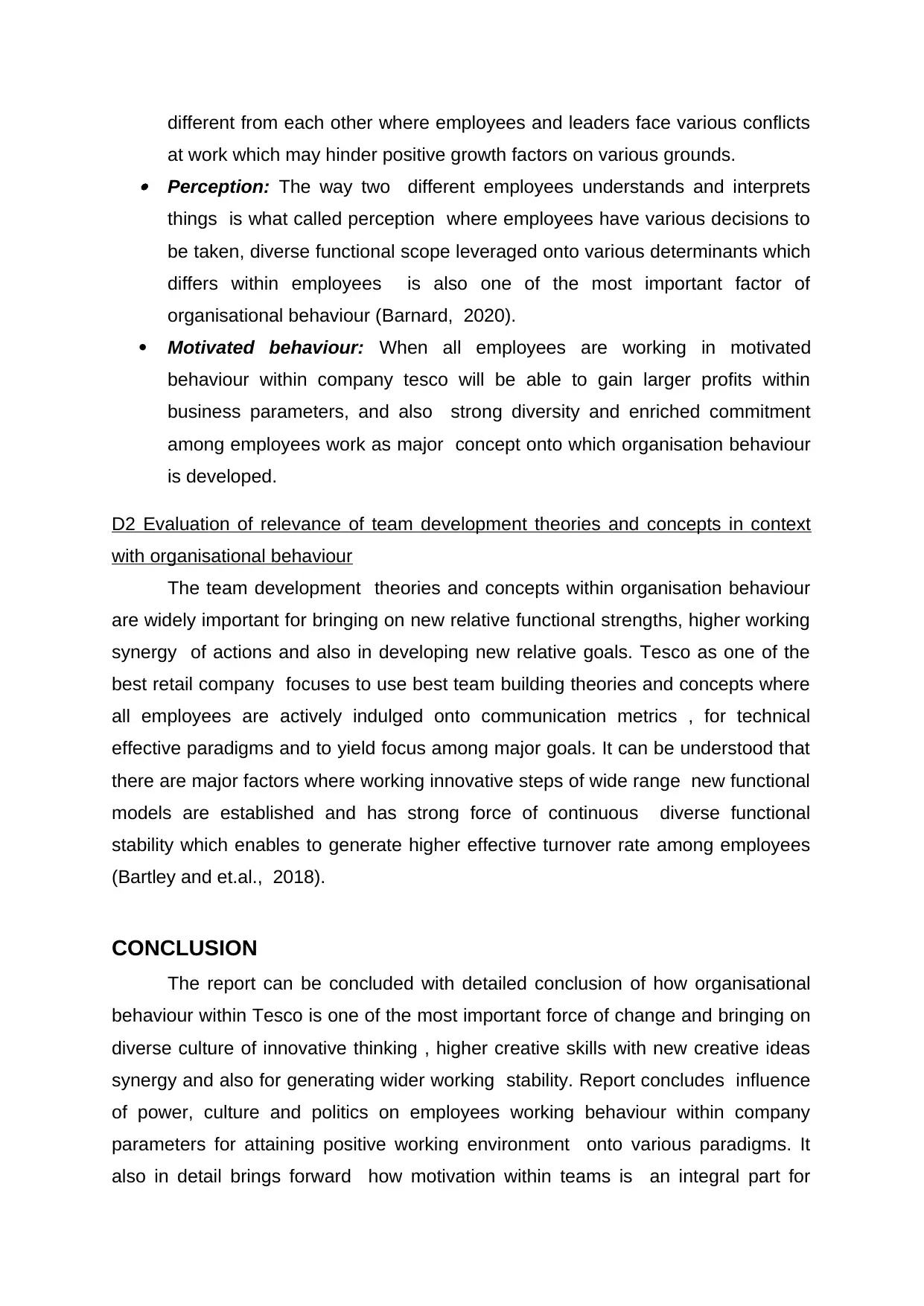
different from each other where employees and leaders face various conflicts
at work which may hinder positive growth factors on various grounds. Perception: The way two different employees understands and interprets
things is what called perception where employees have various decisions to
be taken, diverse functional scope leveraged onto various determinants which
differs within employees is also one of the most important factor of
organisational behaviour (Barnard, 2020).
Motivated behaviour: When all employees are working in motivated
behaviour within company tesco will be able to gain larger profits within
business parameters, and also strong diversity and enriched commitment
among employees work as major concept onto which organisation behaviour
is developed.
D2 Evaluation of relevance of team development theories and concepts in context
with organisational behaviour
The team development theories and concepts within organisation behaviour
are widely important for bringing on new relative functional strengths, higher working
synergy of actions and also in developing new relative goals. Tesco as one of the
best retail company focuses to use best team building theories and concepts where
all employees are actively indulged onto communication metrics , for technical
effective paradigms and to yield focus among major goals. It can be understood that
there are major factors where working innovative steps of wide range new functional
models are established and has strong force of continuous diverse functional
stability which enables to generate higher effective turnover rate among employees
(Bartley and et.al., 2018).
CONCLUSION
The report can be concluded with detailed conclusion of how organisational
behaviour within Tesco is one of the most important force of change and bringing on
diverse culture of innovative thinking , higher creative skills with new creative ideas
synergy and also for generating wider working stability. Report concludes influence
of power, culture and politics on employees working behaviour within company
parameters for attaining positive working environment onto various paradigms. It
also in detail brings forward how motivation within teams is an integral part for
at work which may hinder positive growth factors on various grounds. Perception: The way two different employees understands and interprets
things is what called perception where employees have various decisions to
be taken, diverse functional scope leveraged onto various determinants which
differs within employees is also one of the most important factor of
organisational behaviour (Barnard, 2020).
Motivated behaviour: When all employees are working in motivated
behaviour within company tesco will be able to gain larger profits within
business parameters, and also strong diversity and enriched commitment
among employees work as major concept onto which organisation behaviour
is developed.
D2 Evaluation of relevance of team development theories and concepts in context
with organisational behaviour
The team development theories and concepts within organisation behaviour
are widely important for bringing on new relative functional strengths, higher working
synergy of actions and also in developing new relative goals. Tesco as one of the
best retail company focuses to use best team building theories and concepts where
all employees are actively indulged onto communication metrics , for technical
effective paradigms and to yield focus among major goals. It can be understood that
there are major factors where working innovative steps of wide range new functional
models are established and has strong force of continuous diverse functional
stability which enables to generate higher effective turnover rate among employees
(Bartley and et.al., 2018).
CONCLUSION
The report can be concluded with detailed conclusion of how organisational
behaviour within Tesco is one of the most important force of change and bringing on
diverse culture of innovative thinking , higher creative skills with new creative ideas
synergy and also for generating wider working stability. Report concludes influence
of power, culture and politics on employees working behaviour within company
parameters for attaining positive working environment onto various paradigms. It
also in detail brings forward how motivation within teams is an integral part for
Paraphrase This Document
Need a fresh take? Get an instant paraphrase of this document with our AI Paraphraser
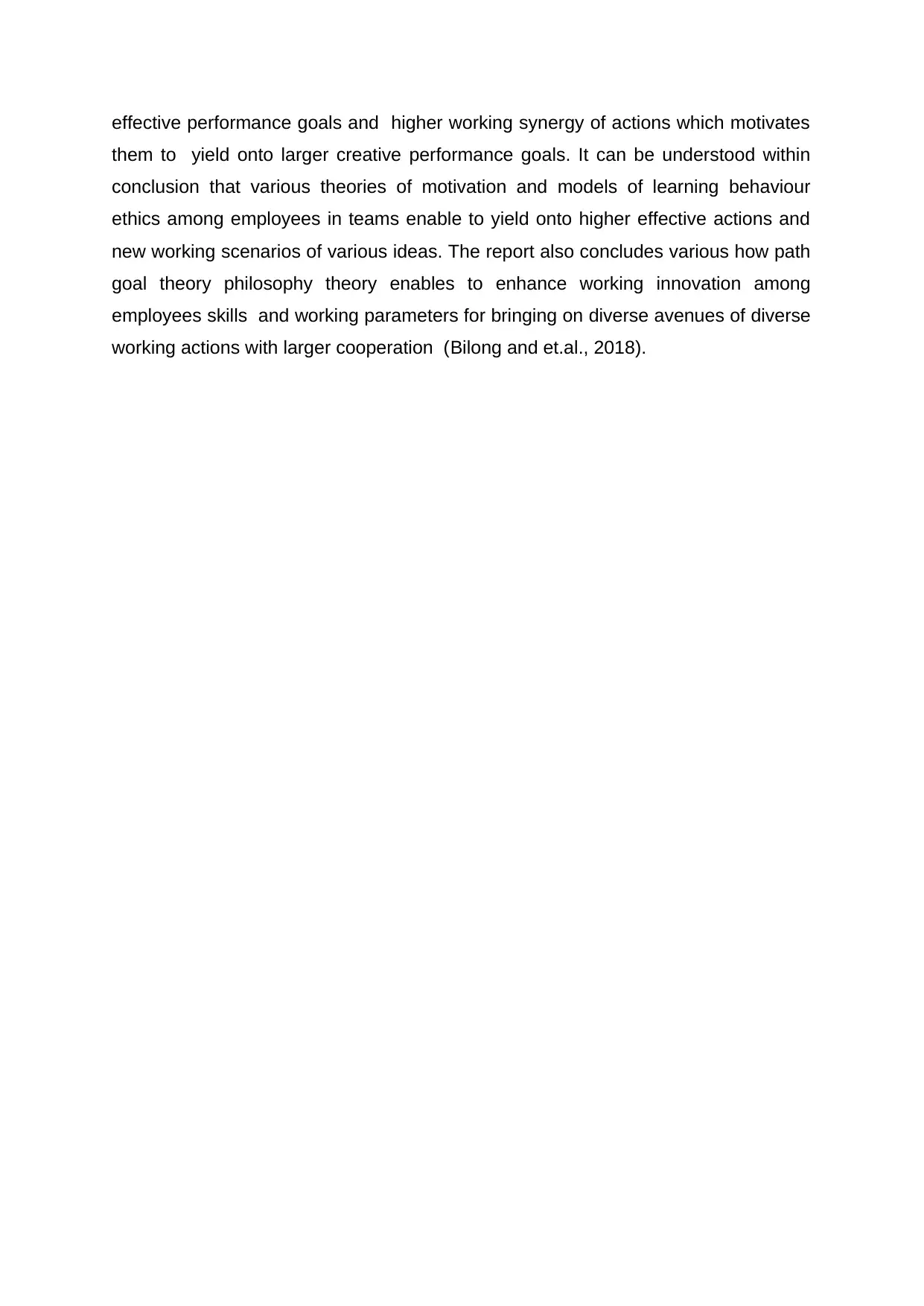
effective performance goals and higher working synergy of actions which motivates
them to yield onto larger creative performance goals. It can be understood within
conclusion that various theories of motivation and models of learning behaviour
ethics among employees in teams enable to yield onto higher effective actions and
new working scenarios of various ideas. The report also concludes various how path
goal theory philosophy theory enables to enhance working innovation among
employees skills and working parameters for bringing on diverse avenues of diverse
working actions with larger cooperation (Bilong and et.al., 2018).
them to yield onto larger creative performance goals. It can be understood within
conclusion that various theories of motivation and models of learning behaviour
ethics among employees in teams enable to yield onto higher effective actions and
new working scenarios of various ideas. The report also concludes various how path
goal theory philosophy theory enables to enhance working innovation among
employees skills and working parameters for bringing on diverse avenues of diverse
working actions with larger cooperation (Bilong and et.al., 2018).
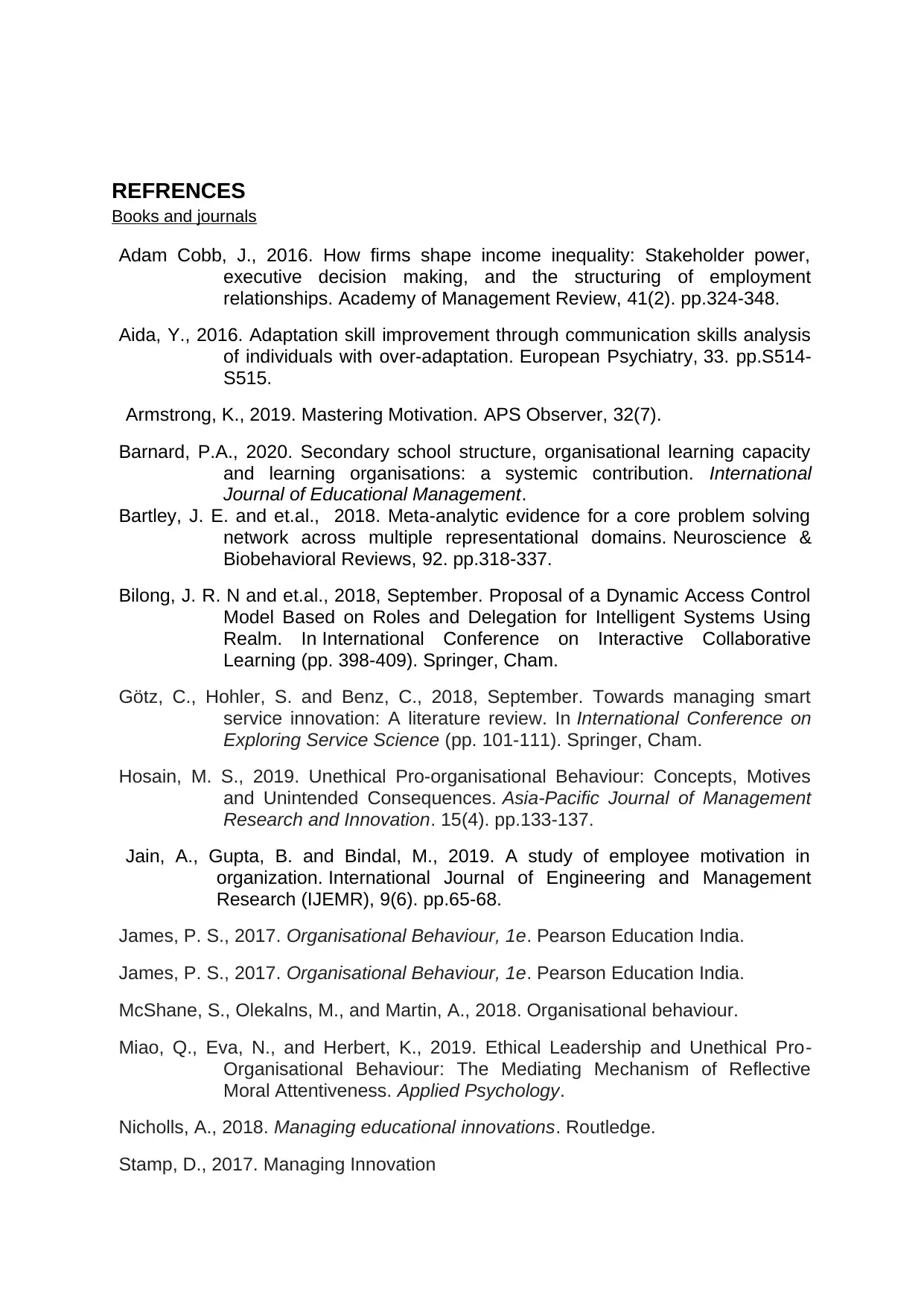
REFRENCES
Books and journals
Adam Cobb, J., 2016. How firms shape income inequality: Stakeholder power,
executive decision making, and the structuring of employment
relationships. Academy of Management Review, 41(2). pp.324-348.
Aida, Y., 2016. Adaptation skill improvement through communication skills analysis
of individuals with over-adaptation. European Psychiatry, 33. pp.S514-
S515.
Armstrong, K., 2019. Mastering Motivation. APS Observer, 32(7).
Barnard, P.A., 2020. Secondary school structure, organisational learning capacity
and learning organisations: a systemic contribution. International
Journal of Educational Management.
Bartley, J. E. and et.al., 2018. Meta-analytic evidence for a core problem solving
network across multiple representational domains. Neuroscience &
Biobehavioral Reviews, 92. pp.318-337.
Bilong, J. R. N and et.al., 2018, September. Proposal of a Dynamic Access Control
Model Based on Roles and Delegation for Intelligent Systems Using
Realm. In International Conference on Interactive Collaborative
Learning (pp. 398-409). Springer, Cham.
Götz, C., Hohler, S. and Benz, C., 2018, September. Towards managing smart
service innovation: A literature review. In International Conference on
Exploring Service Science (pp. 101-111). Springer, Cham.
Hosain, M. S., 2019. Unethical Pro-organisational Behaviour: Concepts, Motives
and Unintended Consequences. Asia-Pacific Journal of Management
Research and Innovation. 15(4). pp.133-137.
Jain, A., Gupta, B. and Bindal, M., 2019. A study of employee motivation in
organization. International Journal of Engineering and Management
Research (IJEMR), 9(6). pp.65-68.
James, P. S., 2017. Organisational Behaviour, 1e. Pearson Education India.
James, P. S., 2017. Organisational Behaviour, 1e. Pearson Education India.
McShane, S., Olekalns, M., and Martin, A., 2018. Organisational behaviour.
Miao, Q., Eva, N., and Herbert, K., 2019. Ethical Leadership and Unethical Pro‐
Organisational Behaviour: The Mediating Mechanism of Reflective
Moral Attentiveness. Applied Psychology.
Nicholls, A., 2018. Managing educational innovations. Routledge.
Stamp, D., 2017. Managing Innovation
Books and journals
Adam Cobb, J., 2016. How firms shape income inequality: Stakeholder power,
executive decision making, and the structuring of employment
relationships. Academy of Management Review, 41(2). pp.324-348.
Aida, Y., 2016. Adaptation skill improvement through communication skills analysis
of individuals with over-adaptation. European Psychiatry, 33. pp.S514-
S515.
Armstrong, K., 2019. Mastering Motivation. APS Observer, 32(7).
Barnard, P.A., 2020. Secondary school structure, organisational learning capacity
and learning organisations: a systemic contribution. International
Journal of Educational Management.
Bartley, J. E. and et.al., 2018. Meta-analytic evidence for a core problem solving
network across multiple representational domains. Neuroscience &
Biobehavioral Reviews, 92. pp.318-337.
Bilong, J. R. N and et.al., 2018, September. Proposal of a Dynamic Access Control
Model Based on Roles and Delegation for Intelligent Systems Using
Realm. In International Conference on Interactive Collaborative
Learning (pp. 398-409). Springer, Cham.
Götz, C., Hohler, S. and Benz, C., 2018, September. Towards managing smart
service innovation: A literature review. In International Conference on
Exploring Service Science (pp. 101-111). Springer, Cham.
Hosain, M. S., 2019. Unethical Pro-organisational Behaviour: Concepts, Motives
and Unintended Consequences. Asia-Pacific Journal of Management
Research and Innovation. 15(4). pp.133-137.
Jain, A., Gupta, B. and Bindal, M., 2019. A study of employee motivation in
organization. International Journal of Engineering and Management
Research (IJEMR), 9(6). pp.65-68.
James, P. S., 2017. Organisational Behaviour, 1e. Pearson Education India.
James, P. S., 2017. Organisational Behaviour, 1e. Pearson Education India.
McShane, S., Olekalns, M., and Martin, A., 2018. Organisational behaviour.
Miao, Q., Eva, N., and Herbert, K., 2019. Ethical Leadership and Unethical Pro‐
Organisational Behaviour: The Mediating Mechanism of Reflective
Moral Attentiveness. Applied Psychology.
Nicholls, A., 2018. Managing educational innovations. Routledge.
Stamp, D., 2017. Managing Innovation
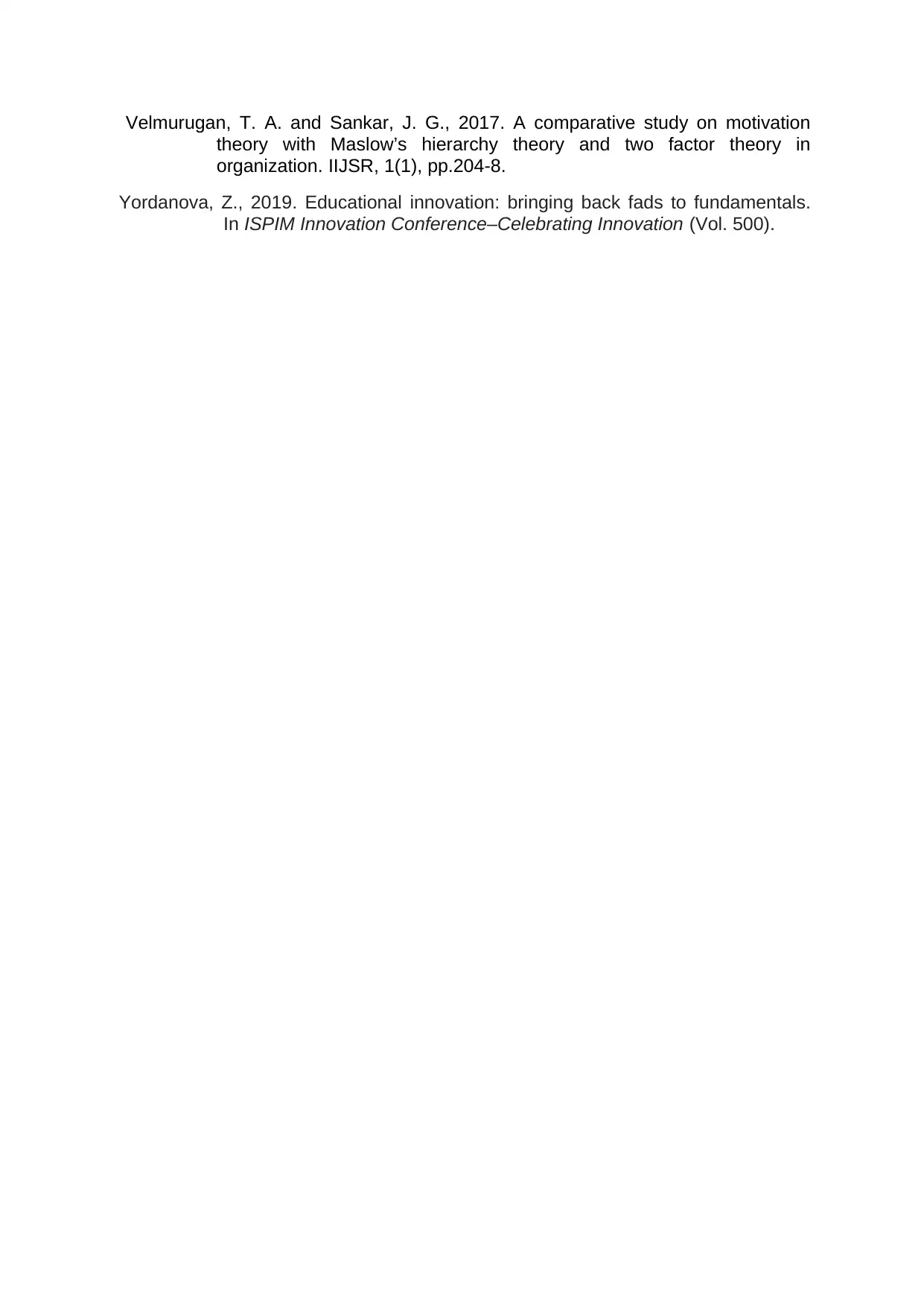
Velmurugan, T. A. and Sankar, J. G., 2017. A comparative study on motivation
theory with Maslow’s hierarchy theory and two factor theory in
organization. IIJSR, 1(1), pp.204-8.
Yordanova, Z., 2019. Educational innovation: bringing back fads to fundamentals.
In ISPIM Innovation Conference–Celebrating Innovation (Vol. 500).
theory with Maslow’s hierarchy theory and two factor theory in
organization. IIJSR, 1(1), pp.204-8.
Yordanova, Z., 2019. Educational innovation: bringing back fads to fundamentals.
In ISPIM Innovation Conference–Celebrating Innovation (Vol. 500).
1 out of 16
Related Documents
Your All-in-One AI-Powered Toolkit for Academic Success.
+13062052269
info@desklib.com
Available 24*7 on WhatsApp / Email
![[object Object]](/_next/static/media/star-bottom.7253800d.svg)
Unlock your academic potential
© 2024 | Zucol Services PVT LTD | All rights reserved.





